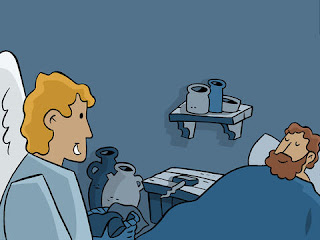Today is the fourth Sunday of Advent. Christmas is just one week away. I suspect
that many of us are still busy preparing for the Christmas holidays with family
and friends. There are gifts to buy. Cards
and presents to send. Food to prepare and parties to attend. On top of all this
activity, we may have worries and concerns about rising costs, health issues,
and keeping peace within our families during the holidays. All this activity,
worry, and concern can give us stress and anxiety.
With so much going we’re distracted from what’s most
important, that very soon we will celebrate God coming among us as a tiny little
baby. Taking some quiet time in prayer to be with and listen to God can help bring
some peace amid our worldly cares. Saint Joseph faced some of the same struggles
that we do and is a good model for us in listening to and having faith in God.
In today’s readings we have of two contrasts faith, Ahaz and
Joseph. In the first reading we hear God speaking to Ahaz, a king of Israel. Ahaz had secured a political alliance with
the Assyrians to protect Israel. In doing so he had to construct altars dedicated
to the Assyrian gods in Jerusalem’s Holy Temple. This was the most sacred place
of the Jewish people, now compromised by Ahaz actions. The Lord asked Ahaz to
request a sign from God so he would have faith in him. But Ahaz refused to do
so, as he put this faith in the political alliance with Assyria. Ahaz put his
faith in the powers of the world rather than God. The prophet Isaiah revealed
the sign to Ahaz, a virgin would conceive and bear a son, and shall name him
Emmanuel, which meant God with us. This prophecy would be fulfilled 700 years
later with the birth of Jesus.
Joseph was
struggling with his own worldly concerns. He and Mary were in their first stage
of marriage but did not yet live together. He had come to learn that Mary was pregnant,
which caused great concern. If she had
unfaithful, she could be subject to being to death under Jewish law.Joseph had
another option he could exercise in the case of infidelity, which was to quietly
divorce Mary.
Joseph must have been distressed with the news of Mary’s pregnancy. Being a righteous men Joseph was open to listening to God, even in his
dreams. He received his answer that it was by power of God, through the Holy Spirit, that Mary conceived the child. By his courage and faith in God, Joseph was able to understand how Mary’s pregnancy came about and could now to take her into his home. Not one word was spoken by Joseph in any of the Gospels. His faith in God, rather than the world, spoke much louder than any words could do.
Some key passages in Matthew’s Gospel indicate how Isaiah’s
prophecy was fulfilled. With the angel referring to Joseph as a Son of David,
it links the lineage of Messiah as a descendent of King David’s. In asking
Joseph to name the child Jesus, it clearly established his role as his father
in the Jewish tradition.
Jesus’ name means God saves. God freely chose to come into
the world as a tiny little baby just like each of us. He comes as Emmanuel,
which means “God with us”, to save us from our sins. He has a human mother,
Mary, who answered yes to God to divinely conceive God’s Son. He has a human stepfather,
Joseph, who said yes to take Mary as his wife and care for him as his own son. Jesus
became one with us to experience the joys and triumphs, pains, and sufferings, so
we could personally come know God and have faith in him as our savior.
This final week of Advent let’s take
some time away from our worldly cares to be with God. Saint Joseph did so and
got the answer he needed to say yes to his faith in God. I’d like to suggest a
quiet way to pray and be with Jesus in his humblest humanity as a tiny infant. Find
a quiet place and close your eyes and think about the first time you held your
own child, grandchild, or a child of a family member or friend. Think of how
much joy this precious little baby child brought to you,
asleep in your arms totally dependent on you. Rest in the
peace of this memory and then place the child in a crib. Now imagine Mary joyfully
coming to you to give her own infant son Jesus to hold. Now just rest a while
holding the infant Jesus and reflecting how grateful you are for his coming
into the world like one of us. After a time give him back to Joseph and Mary
thanking them for their faith in God and asking for their prayers for your
faith in God to be as strong as theirs.










